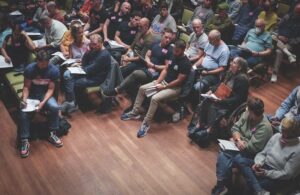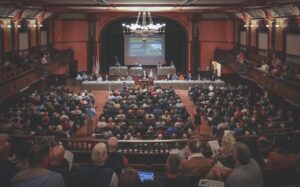PROVINCETOWN — All 14 articles on the warrant passed at the special town meeting on Oct. 23, including a $2-million purchase of land for new housing on Nelson Avenue and two measures to regulate short-term rentals.

Turnout was high, with 493 voters present at town hall, but agreement still seemed to come easily. About half the votes appeared to be unanimous, and even Articles 11 and 12, the two measures proposing new short-term rental regulations — a topic that had been hotly debated at the April town meeting — drew only about 10 votes in opposition.
The meeting sailed through the first seven measures, which consisted of several relatively small funding and accounting changes and a utilities easement at the town’s new police station. But voters had more to say about Article 8, the proposed purchase of almost an acre of land at 22, 22R, and 24 Nelson Ave.
William Mullin said the property was a “money pit” that should not be pursued when the town had not yet finished plans for other usable parcels, such as at the Veterans Memorial Community Center.
Dennis Minsky endorsed the purchase but said that if the town really did develop a proposal for 50 or 60 units of housing there, he would argue against that project down the road.
Jackie Fung said she was an abutter to the parcel and that she and her neighbors had been accused of NIMBYism when they opposed the private housing development that was approved for the same parcels in January after 13 months of hearings.
“None of the comments at the planning meetings for this project ever objected to affordable housing,” Fung said, adding that, in her conversations, neighbors had said they wanted the whole project to be affordable.
“I’m fully in support of the purchase of these lots by the town, and I believe most of my neighbors are also supportive,” Fung said. She also said she hoped the town’s affordable housing project would “take into account our concerns about density, traffic, parking, water runoff, and wilderness destruction.”
Michela Murphy said that “most people in this room can agree that the biggest problem we have is housing, and most of our other problems stem from the housing crisis.” She urged people to “vote for housing as often as you can.”
When the article was called to a vote, there was a sea of hands in favor and only about six against.
Voters had questions about Article 9 as well, which declared the site of the current police station at 26 Shank Painter Road to be “surplus property” so the select board could convey it to a developer for housing.
Austin Fiszel wanted to know why the proposal that the select board endorsed in July had only three parking spaces for 40 units, while Thanassi Kuliopulos wanted assurances that the year-round rental units would really be occupied year-round. Maria Marelli said that the developers had offered a plan in which “the rents are very high” and said that, at the Harbor Hill apartments, the town had actually lowered its initial monthly rents because applicants couldn’t afford them.
“Any developer would have to charge fair market rents; they cannot be exorbitant, and that’s something the town can negotiate,” said Town Manager Alex Morse. He also invited voters to voice their concerns at the town’s “pressure points” — the planning and zoning boards — as the project advances.
Article 9 passed overwhelmingly, with about five people voting against it.
The next article, a similar “surplus property” declaration to enable the development of housing at 288A Bradford St., included comments from Patricia Ainsworth, a tenant who uses a wheelchair and has lived there for 40 years.

“I’m wondering why the historic commission hasn’t looked at my house — I would hate to see such a beautiful building be bulldozed,” she said. “I would like to thank the town manager, who has been very kind and helpful in trying to relocate me,” Ainsworth added, “but during a housing crisis it’s very hard to find a two-bedroom handicapped-accessible place to live.”
“If there’s an apartment in town that’s not ADA-accessible, we have the funds to make it ADA-accessible,” Morse said. The town’s preliminary assessments were for 15 units of new construction, and Morse said there might be a way to reuse some pieces of the old house in the new project.
Article 10 passed almost unanimously, with only one or two hands raised in opposition.
Short-Term Rentals
Before the meeting moved on to Articles 11 and 12, Morse gave a brief presentation on short-term rental regulations.

“It became very clear in April that a significant number of residents voiced support to pass short-term rental regulations,” Morse said. “At the time, we were in the midst of an impact analysis, and I want to share brief sections of that.”
The UMass Donohue Institute found that the primary use of housing in Provincetown is as vacation homes. “It’s rare that folks are buying homes solely to use as short-term rentals,” Morse said, because in most cases short-term rentals were secondary to the owner’s personal use of the home.
“To ensure future properties are not used only as short-term rentals, for investment purposes only, we are proposing these consensus measures: a ban on corporations obtaining short-term rental certificates, Article 11, and a limit on the number of short-term rental certificates an individual can have to two, Article 12,” Morse said.
Voter Brian DeLaurentis said that the penalty clauses in Article 11 were draconian, and he proposed an amendment to strike two of them from the bylaw. Town Moderator Mary-Jo Avellar allowed the amendment on the floor, but it was called to an immediate vote by Jennifer Cabral, and it was defeated with only about seven votes in favor.
After about five minutes of discussion, the vote on Article 11 was called. The measure passed overwhelmingly, with about nine votes against it.
The debate on Article 12 was much the same. Brian Walsh offered an amendment to lower the number of short-term rental certificates each person could have from two to one, but Avellar said that would make the measure more restrictive than was publicly advertised and so was not an allowable amendment. Walsh withdrew his amendment, endorsed Article 12, and said he hoped it could be “improved and enhanced” at future town meetings.
A few voters asked questions. After about 10 minutes of discussion, Pat Miller, president of the Provincetown Part-Time Resident Taxpayers Association, came to a microphone. “The rationale for this article is that this restriction could be used to encourage homeowners to have connections with the community,” Miller said. “Our members are very much in support of that.”
Miller said that her organization’s members were allowed only “three minutes at a select board meeting, when the die has already been cast.
“We want an avenue to be part of formulating the policy — not a vote — but a meaningful voice to participate in the process,” Miller said. She did not say whether her group was for or against the article before the town.
A couple dozen people applauded, and the next speaker called for a vote on Article 12. It passed by a large margin, with about 10 votes against it.
Article 13, a ban on fractional home ownership arrangements similar to one passed by Tisbury’s town meeting this spring, passed unanimously with little discussion. The night’s final article, an adjustment to the town’s accessory dwelling unit bylaw, drew only five votes in opposition.
With that, Avellar asked for and received a motion to adjourn. Provincetown had become the first town on Cape Cod with a short-term rental bylaw, and the entire meeting had taken less than two hours.



